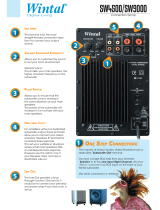
2
TABLE OF CONTENTS
SAFETY WARNINGS AND GUIDELINES ....................................................................................................................................... 3
INTRODUCTION ................................................................................................................................................................................................ 4
CUSTOMER SUPPORT ................................................................................................................................................................................. 5
PACKAGE CONTENTS ................................................................................................................................................................................. 5
SPEAKER BREAK-IN ...................................................................................................................................................................................... 5
SPEAKER PLACEMENT ............................................................................................................................................................................... 6
Front Main Speakers ............................................................................................................................................................................. 6
Center Channel Speaker .................................................................................................................................................................... 7
Surround Speakers.................................................................................................................................................................................. 8
Subwoofer ..................................................................................................................................................................................................... 8
SPEAKER CONNECTIONS ......................................................................................................................................................................... 9
Preparation .................................................................................................................................................................................................... 9
Connecting the Satellite and Center Speakers........................................................................................................... 12
Connecting the Subwoofer .......................................................................................................................................................... 13
SETUP ...................................................................................................................................................................................................................... 15
Amplifier/Receiver Settings ......................................................................................................................................................... 15
Subwoofer Settings ............................................................................................................................................................................. 15
TROUBLESHOOTING .................................................................................................................................................................................. 17
TECHNICAL SUPPORT ............................................................................................................................................................................... 17
SPECIFICATIONS ............................................................................................................................................................................................ 18
REGULATORY COMPLIANCE .............................................................................................................................................................. 19
Notice for FCC .......................................................................................................................................................................................... 19
Notice for Industry Canada .......................................................................................................................................................... 20























